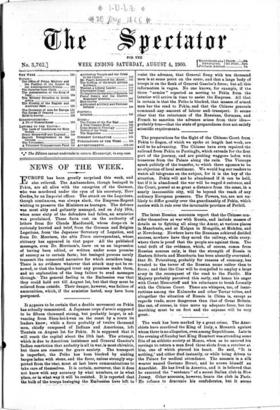It appears to be certain that a double movement on
Pekin has actually commenced. A Japanese corps d' armge supposed to be fifteen thousand strong, but probably larger, is ad- vancing from Shan-hei-kwan on the coast by a route its leaders know; while a force probably of twelve thousand men, chiefly composed of Indians and Americans, left Tientsin on August 1st for Pekin. It is supposed that it will reach the capital about the 10th inst. The attempt, which is due to American insistence and General Gaselee's 'Indian conviction that audacity is all in war, is most chivalric, but there are reasons for grave anxiety. The transport is imperfect, the Peiho has been blocked by sinking barges laden with stone, and the force, unless strongly sup- ported from the rear, lomat at last leave communications to take care of themselves. It is certain, moreover, that it does not know with any accuracy by what numbers, or in what place, or in what way it will be resisted.. It is reported that the bulk of the troops besieging the Embassies have left to
resist the advance, that General Sung with ten thousand men is at some point on the route, and that a large body of troops is on the flank of General Gaselee's force; but all this information is vague. No one knows, for example, if the three "armies" reported as moving to Pekin from the interior will arrive in time to assist the Empress. All that is certain is that the Peiho is blocked, that masses of armed men bar the road to Pekin, and that the Chinese generals command -any -amount of labour- and transport.- It seems clear that the reluctance of the Russians, Germans, and French. to sanction the advance arises from their idea— probably true—that the state of preparedness does not satisfy scientific requirements.


































